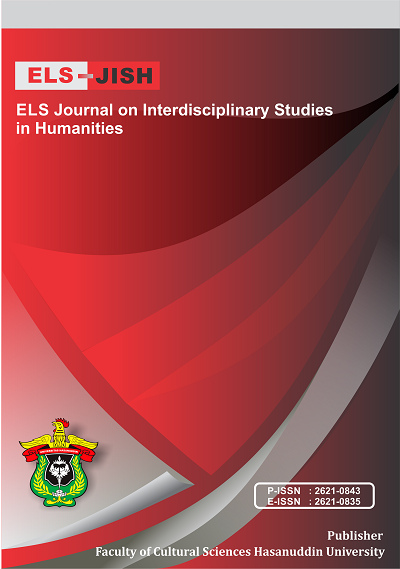Student’s Experience of New Learning System in Covid-19 Pandemic
DOI:
https://doi.org/10.34050/elsjish.v5i4.23928Keywords:
Covid-19 Pandemic, Learning, New Learning System, Student’s ExperienceAbstract
The Covid-19 had changed the educational system in Indonesia. The students must be survived with the change of educational system. They are required to use the internet-based media and technology during covid-19 pandemic. This study aimed to explore how the students experience of the change of learning system from face to face learning to online learning and finding deep information from the students who life in the rural area. The present study applied qualitative research to explore how the students in Maluku Utara survive in distance learning by examine how their experience in online learning. The result of this study gives several contributions about the how the students experience in online learning in Maluku Utara. The first, in conducting online learning the students must struggle with the condition of network in Maluku Utara. There were some areas that is not supported by the network so the students must go to the area that has a good network. This phenomenon becomes the main problem of the students in having online learning. The second, the process of online learning conducted both synchronous and asynchronous. They use social media as the media of communication, giving information and instruction. The third, most of the students used smartphone as the device in conducting online learning. However, in some school the student who does not have smartphone used I-pad from their school. The last, the students from Maluku Utara were easy to adapt the new system of learning.
References
Baczek, M., Zaganczyk-Baczek, M., Szpringer, M., Jaroszynski, A., & Wozakowska-Kaplon, B. (2021). Students' perception of online learning during the COVID-19 pandemic: a survey study of Polish medical students. Medicine, 100(7).
BBC. (2020, March 18). Sekolah di rumah mulai diterapkan, tak semua siap. BBC News Indonesia. Retrived from https://www.bbc.com/indonesia/indonesia-51906763
Buselic, M. (2017). Distance Learning – concepts and contributions. Oeconomica Jadertina, 2(1). https://doi.org/10.15291/oec.209
CNN Indonesia. (2020). Sekolah Libur Karena Corona, KPAI Sebut Guru buat Siswa Stres. Retrieved from https://www.cnnindonesia.com/nasional/20200318222319-20-484760/sekolah-libur-karena-coronakpai-sebut-guru-buat-siswa-stres
Griffiths, B. (2016). A Faculty’s Approach to Distance Learning Standardization. Teaching and Learning in Nursing, 11(4), 157–162. https://doi.org/10.1016/j.teln.2016.04.004
Hsieh, W. M., & Tsai, C. C. (2017). Taiwanese high school teachers’ conceptions of mobile learning. Computers and Education, 115, 82–95. https://doi.org/10.1016/j.compedu.2017.07.013
Indonesia Inside. (2020, March 18). KPAI: Orang Tua Keluhkan Pembelajaran Daring di Tengah Wabah Corona.Indonesiainside.id. Retrieved from https://indonesiainside.id/news/nasional/2020/03/18/kpai-orang-tuakeluhkan-pembelajaran-daring
Kebritchi, M., Lipschuetz, A., & Santiague, L. (2017). Issues and Challenges for Teaching Successful Online Courses in Higher Education. Journal of Educational Technology Systems, 46(1), 4–29. https://doi.org/10.1177/0047239516661713
Kuznetsova, E. O., Shafazhinskaya, N. E., Kamenets, A. V., Meleshkina, E. A., & Orlova, N. G. (2020). Change of Postmodern Paradigm in Cultural studies and Socio-cultural Practice. Rupkatha Journal on Interdisciplinary Studies in Humanities, 12(1). https://doi.org/10.21659/rupkatha.v12n1.17
Luschei, T. F., & Zubaidah, I. (2012). Teacher training and transitions in rural Indonesian schools: A case study of Bogor, West Java. Asia Pacific Journal of Education, 32(3), 333–350. https://doi.org/10.1080/02188791.2012.711241
Mahjob, H. M. P. (2021). Virtual education, new and callenging experiences: corona pandemic in the most deprived province of the country. J. Med. Edu. Develop, 15(4), 294-296.
Najimi, A., Yamani, N., & Soleimani, B. (2017). Needs assessment of virtual training development: Assessment of the level of readiness at faculties of Isfahan University of Medical Science.
Pujari, D. R. (2020). Impact of CORONA Virus on Indian Education Systems, UGC Care Journal, 31, 1-3.
Samruayruen, B., Enriquez, J., Natakuatoong, O., & Samruayruen, K. (2013). Self-regulated learning: A key of a successful learner in online learning environments in Thailand. Journal of Educational Computing Research, 48(1), 45–69. https://doi.org/10.2190/EC.48.1.c
Sun, L., Tang, Y., & Zuo, W. (2020). Coronavirus pushes education online. Nature Materials, 19(6), 687. https://doi.org/10.1038/s41563-020-0678-8
Wong, J., Baars, M., Davis, D., Van Der Zee, T., Houben, G. J., & Paas, F. (2019). Supporting Self-Regulated Learning in Online Learning Environments and MOOCs: A Systematic Review. International Journal of Human-Computer Interaction, 35(4–5), 356–373. https://doi.org/10.1080/10447318.2018.1543084
Tam, G., & El-Azer D. (2020) 3 ways the coronavirus Pandemic could reshape education. World Economic Forum.
United Nations, (2020). Policy Brief: Education during COVID-19 and beyond. United Nations. Retrieved from https://www.un.org/development/desa/dspd/wpcontent/upload/sites/22/2020/08/sg policy brief covid-19 and education augus 2020. pdf.
Downloads
Published
How to Cite
Issue
Section
License
Copyright (c) 2022 Firmansyah Firmansyah, Salmia Syarifuddin, Yetty Yetty, Susi Astiantih

This work is licensed under a Creative Commons Attribution-NonCommercial-ShareAlike 4.0 International License.






